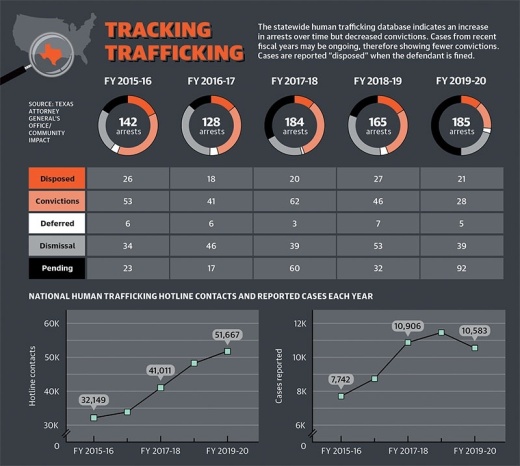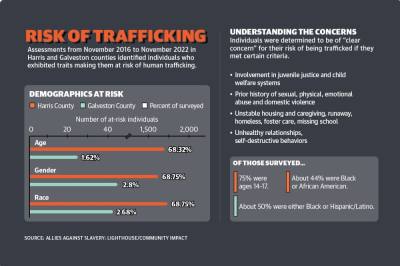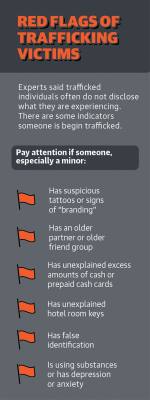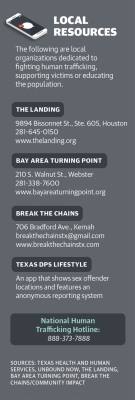Kuykendall shared her story at a Bay Area human trafficking awareness and prevention event hosted by the Houston Airport System Nov. 4, part of renewed efforts by activists and law enforcement agencies to amplify signs of the crime and methods for preventing it. Human trafficking is the exploitation of individuals for forced labor or sex by a third party for financial gain, according to the Texas Attorney General’s Office.
Kuykendall said she was living in Fort Bend County when she met the person who trafficked her at her dad’s apartment in Pasadena. The trafficker drove from Pasadena to Fort Bend County to pick Kuykendall up and take her into Houston.
This happened several times before she started to be flown out of the George Bush Intercontinental Airport.
“I would be flown out on a Friday, returned on a Sunday and sitting in my seat at Taylor Ray Elementary Monday morning,” Kuykendall said.
Kuykendall said it took many years for her to go to the Pasadena Police Department and report the offenses. When she did, she was informed the trafficker had been charged four times in three different states, including charges of compelling prostitution, sexual performance by a child and sexual assault.
“As an adult looking back on my victimization, I try to imagine that 10-year-old child walking through an airport,” Kuykendall said. “And I can tell you one thing: Nobody in the airport saw me. Nobody in the school saw me. Nobody in the child welfare system saw me.”
Local human trafficking awareness and prevention groups at the Nov. 4 event promoted resources for combatting the crime, expressing the importance of a victim-centered approach to prevent cases like Kuykendall’s from going unnoticed again.
Tracking the crime
In 2007, the Texas Legislature passed House Bill 1121, requiring the Texas attorney general to release an annual report regarding human trafficking laws and prevention. These steps led to establishing a task force dedicated to collecting statewide data on the crime and developing legislative recommendations.
The data shows 185 human trafficking arrests took place across the state in fiscal year 2019-20, the most recent data available. This represents a large increase in arrests since the start of the program in 2007 at 39 arrests. While the year shows a drop in convictions at 28, the website stated cases from recent years feature more pending cases.
Harris County Sheriff Ed Gonzales said the county’s human trafficking unit has conducted 51 operations, closed 186 cases and made more than 144 arrests relating to human trafficking in 2022. Meanwhile, in Galveston County, the district attorney’s office reported three cases with a trafficking offense code have been closed since 2018—two in 2021 and one in 2022.
However, Jack Roady, Galveston County’s criminal district attorney, said common practices for prosecuting traffickers mean efforts to combat the crime cannot be accurately measured by statistics alone.
“Human trafficking offenses are often prosecuted not under the label of ‘human trafficking’ but rather as other offenses, depending on the evidence in each case,” Roady said.
Brent Haynes, Galveston County’s assistant criminal district attorney, said tracking human trafficking cases can be difficult because the cases tend to more prominently involve other related crimes based on evidence available, including sexual assault, kidnapping and organized crime.
“Human trafficking is a prosecutorial tool, and it’s not always the tool that you use or even the most effective tool,” Haynes said.
Texas Department of Public Safety officer Danielle LaFosse said the state modified the way it codes human trafficking through the Texas Penal Code 20A in 2021. The law exists to expand the definition of the crime, allowing more individuals who commit adjacent crimes to legally fall under the human trafficking label.
“[The law] is taking these traffickers and really putting the book to them,” LaFosse said. “The law basically states that force, fraud, coercion, those are the three main things that a person knowingly has to do to another to profit off of that person.”
LaFosse said the law allows for law enforcement to bypass proving force, fraud and coercion if the suspected victim is under age 18 because a minor cannot consent to sex, allowing for easier prosecution.
“If I have somebody that’s less than 18 years old, and I know that that guy or that lady or whomever they are, is trafficking that person, that child, I have met all the elements for [proving] the crime,” LaFosse said.
Signals of trafficking risk
League City resident Nichole Bowie, the mother of a trafficking victim and founder of advocacy campaign Mady’s Movement, said she was able to retroactively identify signs with the help of educational group Unbound Now.
“I missed every single sign,” Bowie said. “I’m still learning. If it wasn’t for Unbound, I wouldn’t know the specifics.”
Unbound Now Director Kerri Taylor and Bowie said one of the signs a child may be a victim of sex trafficking is a drastic change in behavior. Bowie, reflecting on her daughter Mady’s behavior before she died while being trafficked, said she had started acting out in unusual ways while she was secretly being exploited.
“She started doing crazy things; like she jumped out of the back of the school bus because she didn’t want to ride the bus one day,” Bowie said. “Just really crazy things that just weren’t like her.”
Mady met the person who first trafficked her in a juvenile detention center, Bowie said. Allies Against Slavery, a statewide advocacy group that screens people for their risk level of being a trafficking victim, lists someone under “clear concern” of being trafficked if they are in the juvenile justice and child welfare systems, among other factors.
AAS assessed thousands of individuals in Harris and Galveston from 2016-2022 to determine their risk status. From both counties, the vast majority of individuals of clear concern were females and minors or under age 18.
Taylor indicated some other signs a child may be a victim of some trafficking crime include an unusual tattoo or marking that looks like branding, especially since a minor in Texas must get parental permission to receive a tattoo. She also said to look out for constant illnesses or bruising in various phases, saying even if it is not trafficking, it could indicate a serious situation in need of attention.
“The thing you need to do is just be ready. If you see something, say something [to law enforcement]. ... You don’t have to rescue anyone [yourself],” Taylor said.
Prevention efforts
In reference to Harris County’s goals in combating trafficking, Gonzales said the department’s priority is to identify victims and get them the services they need.
“Those who are selling their bodies for sex are almost always victims, not criminals. Our goal is to rescue and support them,” Gonzales said.
The DPS has made efforts to change its approach toward trafficking victims through a trauma-informed investigation, LaFosse said. For example, she said the department believes individuals soliciting sex are not criminals but instead victims.
“We don’t see them as [sex workers],” she said. “We want to bring them into a safe space. We want to teach them what they had been through is not right.”
Kuykendall said in her experience, people who attempt to connect new victims to traffickers are often victims themselves.
“As law enforcement, it’s very hard to sit there and look at a situation and say, ‘These are the bad guys, and these are the good guys,’” she said. “It has to be on a case-by-case-by-case basis, and you have to really learn what’s going on with all of the individuals involved.”
Kuykendall said she did not receive a trauma-informed response. She said the crimes occurred before Texas enacted the Trafficking Victim Protection Act in 2003, which establishes human trafficking and related offenses as federal crimes.
"We had told doctors at UTMB Galveston what happened to us; we even listed his name. We told judges, lawyers, attorneys in a child custody battle that my parents were having. We also had children’s protective services in our home, but we fell through the cracks every single opportunity,” Kuykendall said. “Tough to hear, but we have made improvements. My story would not happen today.”








